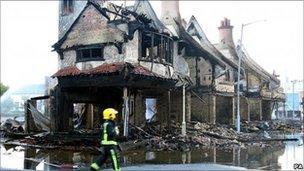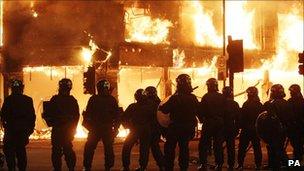London riots: 'Not enough Met officers on duty'
- Published
- comments

The Met has described Monday night's disorder as the worst in its recent history
A top Metropolitan Police officer has admitted the force did not have enough officers on duty to deal with the chaos that erupted on Monday night.
Deputy Assistant Commissioner Steve Kavanagh said officers were stretched as riots, fires and looting broke out across the capital.
On Thursday the prime minister said police were slow to react to the riots.
Trouble first flared on Saturday in Tottenham, north London, after a protest over a man shot dead by police.
The peaceful protest over the fatal shooting of Mark Duggan, 29, was followed by violence which spread into Sunday.
On Monday night about 6,000 police officers were on duty, including officers from neighbouring forces.
Disorder began in Hackney and spread to Croydon, Clapham, Camden, Lewisham, Peckham, Newham, East Ham, Enfield, Woolwich, Ealing and Colliers Wood.
Londoners woke to scenes of chaos as buildings had been gutted by fire, shops smashed by looters and streets littered with missiles used to pelt riot officers.
Mr Kavanagh said: "It certainly stretched us.
"It is clear we did not have the numbers on duty to deal with that despite having mobilised the same number of officers as the total staff of West Midlands Police.
"Our officers did the very best that they could, they did it bravely and they put themselves in danger to do what they could for the safety of London."
Brian Paddick criticises police over riots
But speaking on BBC Question Time on Thursday, former Met Police Deputy Assistant Commissioner Brian Paddick said that had the force handled Saturday's outbreak of disorder in Tottenham differently, the rioting might not have spread across London.
He told the audience: "There was no excuse for not having sufficient officers on duty in Tottenham on Saturday night.
"And if we had had that and if the officers had acted rather than standing back - we saw the pictures on the television of police officers standing back and allowing people to go looting - then I don't think we would have had the copycat violence in Clapham Junction or anywhere else."
He also said criticised the force for failing to respond adequately to the use of social networking tools by some of those involved in the disorder.
"Why weren't the police on Twitter, on Facebook, on Blackberry messaging getting one step ahead of the crowds?"
Mr Paddick said that following criticism about the way the Met had handled the G20 protests, police officers feared they would not be supported if their actions in dealing with the riots led to complaints.

Brian Paddick is critical of the way the first outbreak of rioting in Tottenham was handled
"Officers are afraid of acting robustly because they think there'll be complaints and they won't be supported by their bosses."
The Met has described Monday night's disorder as the worst in its recent history.
More than 1,000 people have been arrested in connection with the riots in London and more than 450 charged.
On Tuesday officers from some 30 forces across the country were sent to the capital to support the Met.
Since then 16,000 officers have been patrolling the streets and will remain in place over the weekend.
Mr Kavanagh said: "London has remained calm for the last two nights and I certainly hope and pray it stays that way."